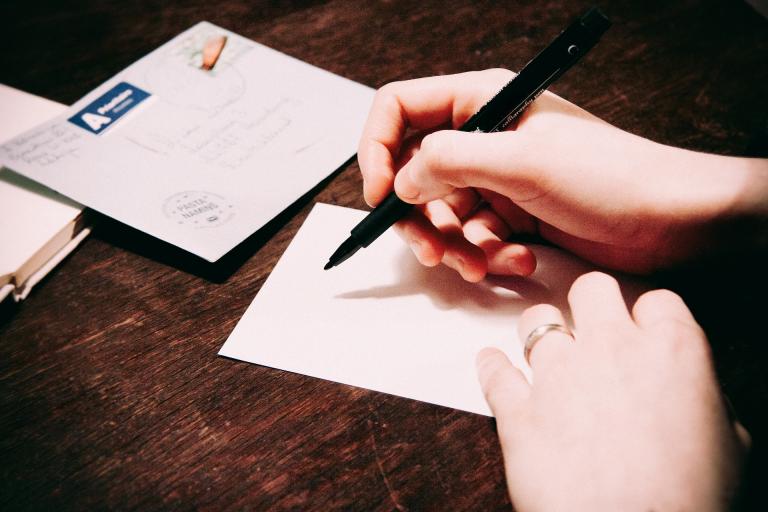
At least for me, an easy misunderstanding of the literary theorist Michael Warner’s first book, The Letters of the Republic, to the field of study on public spheres might be in his reading of letters. When I first started reading the text, I thought that he meant the epistolary form of communication between persons, as a kind of public exchange between the politicians we now know as the bourgeois revolutionaries of the American War of Independence (or the ‘Founding Fathers,’ if you wish to be ideologically correct). After all, if one were to examine the Library of America collections of many of these early republican men (and the ones we read, unfortunately, really are mostly men), one might find a collection of their letters sent to each other. The ones leading up to Alexander Hamilton’s ill-fated duel with Aaron Burr are a case in point, immortalized now in the popular musical Hamilton, which I had the good pleasure to see with a friend of mine who happens to be a Catholic theologian. I know better now about Warner’s argument, that the main thread through his book is that the idea of America came from the development of a print culture that took as its image of the public sphere a kind of republican representational reality, one in which the writers of print material incorporated into their understanding of their audience a limitless number of possibilities of who could be reading and therefore strove to write in an impersonal and impartial way. But I suppose I am still taken with the romance of the letter itself as such a medium. After all, those were also published, and gush they do not, not even when issuing a challenge to duel.
I say all of this because I have recently re-discovered the form of the letter. I do not mean to say that I am buying stamps and sending print letters by postal service, though I probably will get there if the trajectory that I am on continues. But I am sending emails now, reflective ones, ones that could be letters and that I would not mind being published someday. In fact, I am re-discovering the form of the letter to a person that can be read by others to whom it is not addressed. Until recently, I thought that this kind of thing was what blogging was for. I now am discovering that, much more than the blog post, the letter is a form of address that truly straddles the limits between the public and the private – the former because it is directly written to a person and may discuss sensitive material, the latter because they can be forwarded, hacked, subpoenaed, and published – is a genre unto itself and will need to be added to the many genres that I am mastering as a junior academic. I am reflecting that this addition contributes an even more personal dimension to my writing, and it also shows me that the amount of direct personal confession varies by the genre.
I wanted to log this development on my blog because I recently sent a very lengthy email to a friend of mine, with a request that he reply and that we form an email pen pal relationship. He tells me in person that it will happen, and I really hope it does. The reason we are positioning our friendship to be based on email letters is because I have found myself recently tired out by the immediacy of instant messaging, especially with him. Some people more than others have a way of presenting themselves over immediate forms of communication that require one’s total attention. If it has not been clear on this blog, my academic career has recently taken the turn for the better, if only in the development of further clarity in my thinking, so I increasingly find that I cannot endure the interruptions wrought to the necessity for long stretches of concentration that I require to do my work properly. Consequently, I suggested that my friend and I experiment with a long form of communication. The result is turning out to be rather heartfelt and genuine, and I suspect that it will strengthen our friendship while making us more capacious in terms of expressing our truest feelings and exploring them deeply in conversation with each other.
I say all of this, however, because the greater truth is that I have had trouble with writing the email letter for quite some time now. It did not use to be this way. In fact, friends of mine from high school and college will remember the long emails they’d receive from me discussing anything from girls to theology – unless they themselves were the girls in question, in which case they’d only get theology (which is why I was unsuccessful with the vast majority of them). Sometimes, when I felt inspired, I’d even write up what I would have put into an email by hand and then roll it up into a scroll, tie it up with a ribbon, and hand-deliver it. Eventually, these friends of mine told me that I was sending them way too many emails and giving them too many scrolls, but unapologetically, I’d pile on even more, to their amusement. Whenever I got a reply from someone who might have been a girl I was interested in, I’d be ecstatic and run around the house in joy. Secretly, the same went for my friends. It made me happy whenever they would reply and a little sad when they did not.
When I embarked on my academic career, I found that it was the same. Academics profess to enjoy short emails, but the truly honest will confess that a heartfelt one is welcome whatever the length, as long as it is not contrived. I used to send these to my colleagues, my supervisor, random people I met at conferences, senior stars that I’d cold call. Again, I would be overjoyed when I got responses, and we would embark on email relationships that probably should not be described as productive, but really were heartfelt and resulted in the stage that transcended collegiality – what is called friendship. I treasured many of these friends, and I hope they liked me too.
But around the time I finished my doctorate, I began to have an irrational fear of email. I asked myself often whether it was that I was nervous about the job market, or whether it was because I had become a different person who was more ruthless in my approach to competition, or whether it was because I did not want to read yet another reply about rejection or a colleague thinking that my etiquette was wanting (though these last kinds of emails were few and far between, an indication of a fictional fear). I do not think it is any of these things now, but I do think that it was related to the kind of contrived incompetence that I discussed in my previous post, that in an effort to present myself as human and therefore vulnerable, I began to act in judgment of my own faults in a public way and therefore began to act like I was constantly being judged – by myself most often, but I really did not want to receive email confirmation of the flaws that I knew to be all mine. I avoided the email, and sometimes replies would come back to chide me for not replying. It was an odd feeling, to be the man of letters who now hated the letter, and eventually, I came to avoid having anything to do with the medium, though other forms of communication were just fine and if I pushed myself, I could probably reply an email too, but briefly, tersely, and not at all in the personal way I used to write.
I am not sure if you could call that stage of my life of letters a kind of depression, but you could say that email became the impossible task that I had to force myself to do. I would hear about my colleagues engaging in email, and the envy that I had – which again was irrational because if only I’d reply, I’d have them too – compounded my fear of the medium. I became very bad at writing letters, in other words. Instead, I came to a point where only direct messaging, the very form that I used to despise before I finished my doctorate, became the primary way of getting in touch with me. This spelled disaster. I knew back in the day when I hesitated to use it, and I know even now, that instant messaging is the bane of my concentration. The long-form email is the best kind of thing, next to the actual letter, to get in touch with me because I like to sit with the messages I receive, contemplate them, and offer a thoughtful reply. But I was not thinking, and I was not replying.
Friends of mine gently nudged me in showing that my real problem was that somehow, for some reason, and probably not a good one, I had begun to read the world, including the emails I was receiving, as a mirror. This too was true, given what I have recounted of the process of judging myself and not wanting written confirmation of my own judgment. I learned through this process that I had to shatter the mirror in some way, though I did not know how. But I knew that I had gotten better over the summer when I began to reflect on cantoring and competence, and I remember writing in my journal – another genre that is wholly private and kept to myself – that I was amazed at myself. I had written an email. I had sent it. I hadn’t thought much about it, till I realized that it was actually quite a big deal for me.
I began to live into that confidence, sending emails, wanting replies, keeping them heartfelt and confident, and that has culminated in the email I have just sent to my friend, the long heartfelt one in which I declared to him from the outset that the amazing thing is that by him, the long form email – the very form that I had sworn off around the time of my doctorate – has now been re-introduced into my life. Reflecting on that moment feels good, like a kind of spiritual consolation, as the Jesuits have it. I now realize that the genre of the long-form email is that of a letter, and that is different from a blog, or an article, or a peer-reviewed publication, or a book. The letter is personally addressed, but it may have a wider readership, though limited, because it is something in writing. As my Shanghainese grandfather once said to my mother – having endured both Japanese fascism and Chinese communism before he found his way to Hong Kong and was match-made with my ambitious schoolteacher grandmother (she later became a headmistress in a prominent Methodist school) – don’t let anything you don’t mean be put into black and white. My mom told me that years later, and I asked her what it meant. She said that papers are white and pens are black, and if you set pen to paper, you had better mean what you say because anything that is committed to writing can be held against you in the future as a record of exactly what you were thinking at a given moment. Both my mother and grandfather were writers, so they could not have possibly meant what they said as a discouragement toward publication. But what they are saying, I realize, is that I had better damn well mean what I write even in an email before I send it, and if I don’t meant what I say, it is better not to even write it down for private safekeeping.
Emails are personal, and so are handwritten letters, all of them, even if they are just discussing logistics. I now understand that the reason I feared the genre was because in seeing the world as a mirror, I did not have the capacity for address. When I broke the mirror, I was able to write to other persons again. It is not a fear of publication that held me back; it was a contrived insecurity about whether I could ever mean what I was saying about anything.
As I write this, I realize finally that I have written myself back to the point of my mystagogy. At every Divine Liturgy, the Apostol is read. In Richmond, they do it in English and Chinese, and as I have said, I savor the Chinese readings so much as if it were like a mother speaking to my child’s heart in its truest language. But that those readings are called Apostol gives away their genre. They too are letters, addressed to specific persons but heard by the entire assembly, including even me as one born rather late in the game. In this way, the power of the letter is revealed, that in the personal and particular address, something universal – maybe even Catholic – is going on. When you read letters and write them too, you are brought out of yourself, which means that your selfhood cannot be turned in on itself when engaging with this genre of writing. That I am now writing letters again may well indicate that my conversion has started to bear fruit, that just as we received so many people into the Kyivan Church this summer, I too am showing that my reception has resulted in the working of the Lord’s mighty deeds in my own life. I really am Catholic now, or at least maybe I am finally becoming one, and I hope that those who receive my letters will feel the subtle difference when they read them now.
















